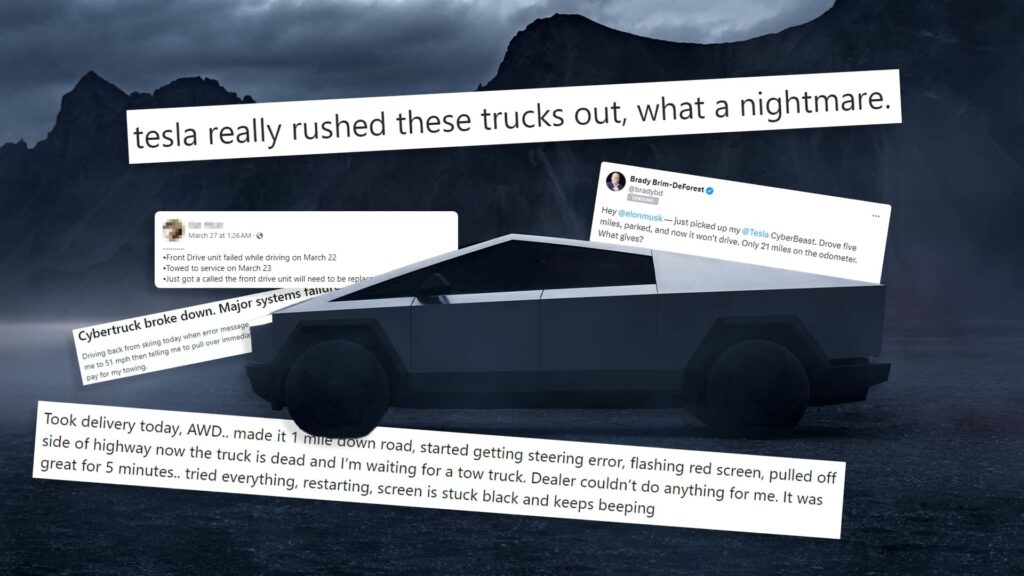Tesla’s flagship electric pickup is a pretty polarizing vehicle. There’s nothing on the road quite like it, and that’s resulted in just about everyone’s eyes being glued to the shiny trapezoid, whether that’s for better or worse.
Being a new product, the Cybertruck will almost certainly have some growing pains as the automaker works to mass-produce it. However, a number of failures resulting in an inoperable six-figure vehicle have caught the attention of many onlookers, and that’s not a great image for Tesla—especially while its sales are slipping and rumors of the company’s cheap $25,000 car being canceled are swirling.
Ramping Up Production
Tesla is steadily ramping up Cybertruck production. While it doesn’t list official numbers, drone footage and internet sleuths predict that Tesla will soon hit an output of 1,000 units per week. However, early production examples show quite a teething problem in the quality control department.
Over the past few months, users have flocked to owners’ forums, Facebook, Reddit, and even Tesla CEO Elon Musk’s platform, X, to vent about issues with their shiny new truck.
Problems include electrical harness problems, onboard Power Conversion System (PCS) failures, broken drive units, corroded grounds, steering and braking problems, and error codes thrown by other unspecified components.
Some owners report that their problems are fixed fairly quickly while others are upset that their truck is estimated to spend more than a month in the shop while it waits on a part from Tesla’s Austin Gigafactory or diagnosis from special Cybertruck-specific techs. Earlier this year, Tesla identified potential issues with the ancillary bay electrical harness, causing a loss of mid-voltage power. It has since published a service bulletin with a fix.
Here are just a few complaints from owners who have taken delivery and experienced a failure that may have ultimately resulted in a tow to the service center:
The above list encompasses just over 20 examples of Cybertruck component failures that resulted in contact with Tesla’s Service Center. There have also been a number of visual and assembly problems that have required service but haven’t been impactful to the truck’s operation.
While this may seem like a small number of vehicles with big issues, it’s important to remember that Tesla has only just started delivering the model in November 2023.
It’s not clear how many Cybertrucks Tesla has actually delivered so far. Tesla does not break out sales numbers completely by model, only that it has delivered 17,027 “other models” (which does not include the Model 3 and Model Y). This may include the Model S, Model X, Semi, and Cybertruck.
Excluding Q4, which is when Tesla began using the “other models” designation, Tesla delivered an average of 15,301 Model S and X units in 2023. In 2022, Tesla delivered an average of 16,676 units per quarter. If Tesla maintained this average, it alludes to just under 1,100 Cybertrucks being sold during the first quarter of 2024. It is currently reported that Tesla is manufacturing upwards of 100 trucks per day at Giga Texas, so it may be that would-be S and X buyers are purchasing the Cybertruck instead of the luxury sedan and SUV, or Tesla has not yet achieved a large number of Cybertruck deliveries in the first quarter—something understandable given the necessary production ramp of a new model.
Perhaps Musk himself has already said it best during a prior earnings call:
When you’ve got a product with a lot of new technology or any brand-new vehicle program, especially one that is as different and advanced as the Cybertruck, you will have problems proportionate to how many new things you’re trying to solve at scale.
Now, look, I get it—launching a new product is hard. Tesla has made a lot of changes with the Cybertruck when compared to the tech in its existing models. That includes an all-new 48-volt architecture, which Tesla bragged about by sending other automakers instructions on how to design such an architecture last year. There will be teething problems. Still, it’s daunting to see a large number of tow-away failures in a short time.

